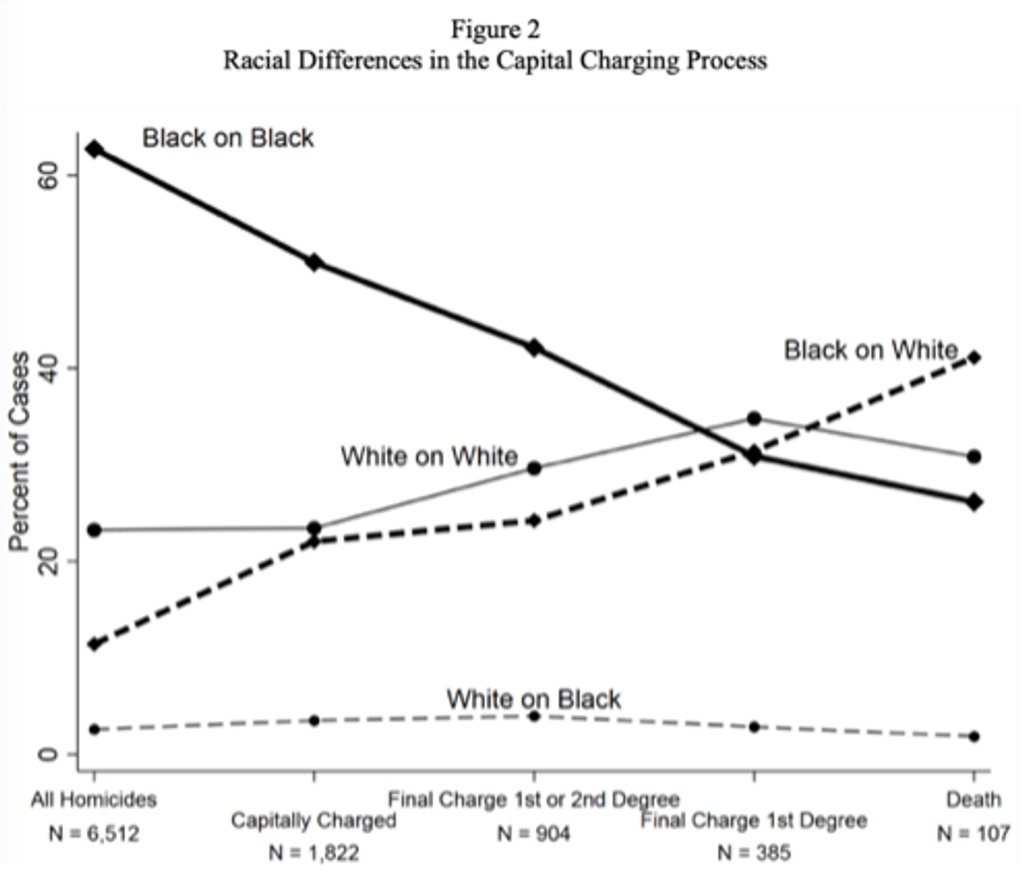Law Reviews
Latest
Oct 13, 2023
New Legal Research Declares “Heightened Standards” of Due Process in Capital Cases an “Illusion”
In a new law review article, Professor Anna VanCleave of the University of Connecticut School of Law argues that the “heightened standards” of due process protection for capital defendants, required under the Eighth Amendment, are in practice no more than “a veneer of legitimacy and procedural caution” that fail to vindicate defendants’ rights. Professor VanCleave found that in the absence of clear guidance from the Supreme Court as to the actual meaning of “heightened standards,” lower courts apply the same standards used in non-capital criminal cases or even relax rules…
Read MoreFeb 17, 2023
LAW REVIEWS: Ensuring Black Lives Matter When the Penalty Is Death
In a 2022 article published in the Idaho Journal of Critical Legal Studies, author Sidney Balman (pictured), examines the relationship between racism and geographical arbitrariness in the application of the death penalty in the U.S. As in other areas of society, he finds that Black lives are not valued equally with others. He cites the Supreme Court’s decision in McCleskey v. Kemp (1987) as the main legal obstacle to reversing this bias affecting capital punishment. “Today,” he writes, “McCleskey has come to stand for the Court’s refusal to address the…
Read MoreOct 07, 2022
Atkins at 20: Assessing the Purported Ban on Executing Individuals with Intellectual Disabilities
In its landmark decision in Atkins v. Virginia in 2002, the U.S. Supreme Court declared that the use of the death penalty against individuals with intellectual disability constituted cruel and unusual punishment in violation of the Eighth Amendment. Twenty years later, however, “there is not just the risk, but the certainty” that states continue to sentence intellectually disabled defendants to death, three legal scholars argue, and the federal courts are letting them get away with it.
Read MoreJul 18, 2022
NEW SCHOLARSHIP: Idaho Study Shows Statute Fails to Limit Death Penalty to Worst Cases
A new study suggests that Idaho’s capital punishment statute fails to narrow the use of the death penalty to the “worst of the worst” crimes, raising questions about its constitutionality. In Narrowing Death Eligibility in Idaho: An Empirical and Constitutional Analysis, published in the February 2022 issue of the Idaho Law Review, Aliza Plener Cover (pictured) argues based on data from nearly 20 years of murder convictions that the Idaho legislature “has done little to meaningfully narrow a subset of those who are most deserving of death.”
Read MoreJul 12, 2022
Law Review: Criminal Defendants Have Limited Ability to Make Meaningful Choices, Especially in Capital Trials
A new law review article highlights the lack of protections for criminal defendants’ rights to make meaningful decisions despite court-recognized rights to autonomy. In “The Myth of Autonomy Rights,” a 2021 article published in the Cardozo Law Review, Professor Kathryn E. Miller (pictured) argues that there are inadequate safeguards for the autonomy rights of the average criminal defendant, especially in capital punishment cases.
Read MoreJun 10, 2022
STUDIES: Louisiana Study Finds Race and Gender Bias in Application of Death Penalty
Louisiana’s death penalty is disproportionately imposed in cases involving white female victims, especially if the defendant in the case is a Black man, a new study by three leading death-penalty researchers has confirmed. Louisiana prosecutors were more than five times as likely to seek the death penalty, and juries more than five times as likely to impose it, in cases involving a Black male offender and a white female victim than in crimes in which both the alleged offender and the victim were Black.
Read MoreOct 04, 2021
New Scholarship: A Review of Virginia’s Death-Penalty Experience Exposes the Myth that the Death Penalty is Reserved for ‘the Worst of the Worst’ Cases
The death penalty is reserved for “’the worst of the worst’ — or at least that is what we are told,” writes University of Richmond law professor Corrina Barrett Lain (pictured) in a Washington & Lee Law Review post-mortem on Virginia’s use of capital punishment. Although the “worst of the worst” is a core command of a constitutionally compliant death penalty, “the death penalty doesn’t just exist in the abstract,” Lain notes. And when she takes the opportunity “to set the record straight about who we execute generally, and what…
Read MoreSep 16, 2021
NEW SCHOLARSHIP: History Says Those Left on Death Row After Capital Punishment Statutes are Struck Down or Repealed Should Not be Executed
“What should become of individuals who are awaiting execution following the repeal or judicial invalidation of capital punishment legislation?,” ask authors James R. Acker (pictured, left) and Brian W. Stull (pictured, right) in a recent article published in the Akron Law Review. If history is a guide, they say, the prisoners’ lives should be spared.
Read MoreAug 25, 2021
NEW SCHOLARSHIP: Death is Indeed Different in U.S. Administrative Law — Condemned Prisoners Receive FEWER Procedural Protections
In the 1970s, the United States Supreme Court famously declared that “death is different” from all other punishments and, as such, required the provision of heightened procedural safeguards to ensure that its application was not cruel or unusual. But in a new article, Death Penalty Exceptionalism and Administrative Law, University of Richmond law professor and capital punishment scholar Corinna B. Lain (pictured) argues that in the context of administrative law, the doctrine has been “turn[ed] … on its head.”
Read MoreMay 12, 2021
In ‘Netherworld’ Between Law and Reality, Nebraska Prosecutors Continue Pursuit of Death Penalty
The legislature doesn’t want capital punishment, the executive branch can’t obtain execution drugs, and Nebraska prosecutors have moved forward this year with the pandemic-delayed capital sentencing trials of two defendants separately convicted of a murder out of a voyeuristic true-crime novel. The state, writes Associated Press reporter Grant Schulte in a May 9, 2021 analysis, is “still wedded to the idea of executing prisoners, just not the practical part of doing it” and appears “caught in a law vs. reality netherworld.”
Read More









